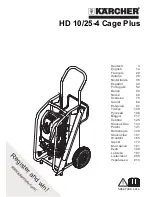
Installation
8
312585G
Grounding
Although water generally provides a natural electrical
ground, the following equipment must be grounded if the
cleaning chemicals are volatile.
The equipment must be grounded. Grounding reduces
the risk of static and electric shock by providing an
escape wire for the electrical current due to static build
up or in the event of a short circuit.
When cleaning in enclosed areas, such as storage
tanks, locate the pump and air compressor outside the
area and well away from it. Provide adequate ventilation.
If the area you are cleaning has stored flammable mate-
rials. take appropriate precautions to avoid static spark-
ing. Consult your local codes.
Pump: use supplied ground wire and clamp. See F
IG
. 2.
Use the ground screw (GS) and lockwasher (LW) to
attach the ground wire (U) at the rear of the air motor.
Tighten the screw securely. Connect the other end of the
ground wire to a true earth ground.
Air and fluid hoses: use only electrically conductive
hoses.
Air compressor: follow manufacturer’s recommenda-
tions.
Spray gun / Dispense valve:
ground through connec-
tion to a properly grounded fluid hose and pump.
Fluid supply container: follow local code.
Object being sprayed: follow local code.
Solvent pails used when flushing: follow local code.
Use only conductive metal pails, placed on a grounded
surface. Do not place the pail on a nonconductive sur-
face, such as paper or cardboard, which interrupts
grounding continuity.
To maintain grounding continuity when flushing or
relieving pressure: hold metal part of the spray
gun/dispense valve firmly to the side of a grounded
metal pail, then trigger the gun/valve.
F
IG
. 2. Ground Wire
GS, LW
TI8250A
U
Summary of Contents for 312585G
Page 11: ...Operation 312585G 11...









































